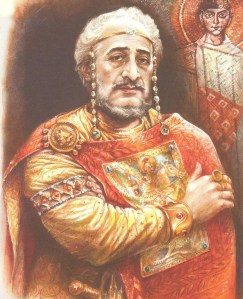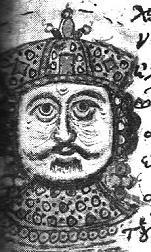The new Emperor Maurice continues fighting on the Eastern front trying to convince the Persians to sign a peace treaty. But they won’t. Meanwhile Slavic settlers spread throughout the Balkans and the Avars continue to demand more money. The Emperor begins to fear for the Empire’s solvency and attempts to cut the pay of his army.
Period: 582-589
Download: Episode 35 – The Lucky Break
RSS Feed: The History of Byzantium
If you want to send in feedback to the podcast:
– Either comment on this post.
– Or on the facebook page.
– Leave a review on Itunes.
– Follow me on Twitter.



Hi, Excellent episode.
I recognized the artist of the illustration right away. This publisher has a number of similar books and a lot of the faces look very similar. So as you said… a big grain of salt.
Here is another book by the same illustrator.
http://kibea.net/en/catalog/international-market/rulers-bulgaria
Hi Robin, thanks for another great episode.
Is there any way of knowing how the 100,000 gold pieces mentioned in this episode as an annual payment to the Avars compares with the 350/700/1400 etc pounds of gold that the Romans paid (or were supposed to pay) annually to the Huns in the 5th century?
Thanks again for all your effort in putting this podcast together.
Good one, I will get on that.
Pretty good likeness between the two images. Another great podcast Robin. Posted episode 35 on google+ community again !!!
Thank you for all the plugs, much appreciated. I enjoy seeing the posts pop up in my inbox.
Hi, I’ve been following your podcast from the beginning. You’ve been doing a fantastic job, and I really appreciate the effort you’ve put in. Thank you!
I’ve been wondering how education, marriage rites, etc. have changed since time period covered in the THoR podcast on those topics (first century AD?). The Roman educational system sounded dreadful, and I’d hope the Greeks have favorably influenced educational practices. I’d also like to know if one sees general philosophical and scientific/technical progress through Byzantine history, if it just hangs on to its legacy, or if there is a slide backwards? It seems, for example, that the India subcontinent, and to a lesser extent the early Muslim world, seem to have had a greater impact on mathematics than the Byzantines (and later Romans). Did construction techniques peak at the time of the Hagia Sophia, or did abilities wither away? That sort of thing. Hopefully touching on these topics doesn’t take away from the historical narrative.
I know this is a little late, but I recall a legend about Belisarias being blinded by a jealous Justinian. I may have missed it, but I do not remember hearing you touch on what would be a remarkable event. Could you maybe talk about that story and how much, if any of it, is true?
Good one 🙂
Robin, the podcast (as of 10 Jul 2017, stops 4 minutes before ending. Is there any way you can solve this issue?
Thanks a lot.
It seems to be working fine for me. You can listen direct from the Acast site if that helps? https://www.acast.com/thehistoryofbyzantium/episode-35-the-lucky-break
Great! It worked perfectly well this time. Thank you so much, Robin.
Wow! Great to know that all podcasts are in acast! I’m having like a binge-listening trying to gulp (and digest) as much as I can. One of my areas of interest as an historian is precisely Byzantium. I’ve read the majority of the books you listed already…years ago. What I needed was exactly this, a fresh view and a reminder of all things Byzantine! Thanks for such a wonderful job, Robin!